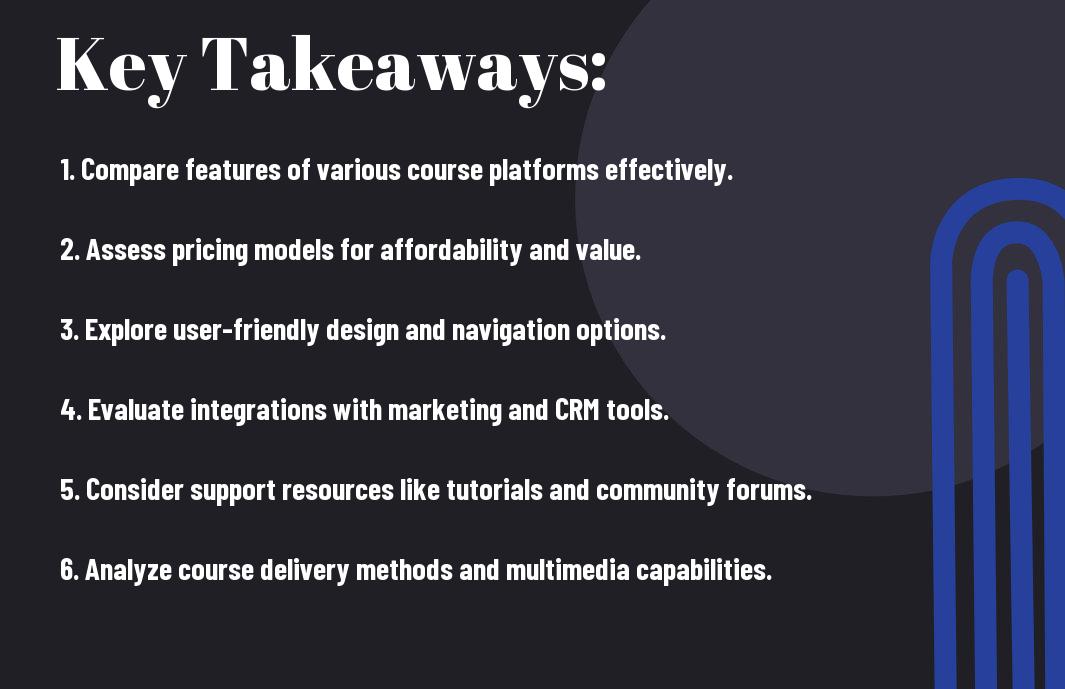Just when you thought choosing an online course platform couldn’t get more complex, we’re here to simplify your decision-making process. Whether you’re an aspiring educator, established instructor, or business professional looking to share your expertise, your choice of platform can make or break your online teaching journey. In this comprehensive guide, we’ll walk you through the top online learning platforms, comparing their features, pricing, and user experience to help you find the perfect match for your educational goals. From course creation tools to marketing capabilities, we’ve tested and analyzed each platform to bring you the most up-to-date insights.


Zenler’s All-in-One Solution
Integration of course creation, marketing, memberships, blogs, and live sessions
Marketing becomes seamless with Zenler’s comprehensive integration of crucial tools. You’ll find everything you need in one platform: from creating engaging courses to building marketing funnels, managing memberships, publishing blogs, and hosting live sessions. This integration eliminates the need for multiple subscriptions and simplifies your workflow. You can interlink different features, making it easier to create cohesive learning experiences for your students.
Comparison with Kajabi, Teachable, and Thinkific
Platform Comparison: Key Features
| Platform | Distinctive Features |
|---|---|
| Kajabi | Higher pricing, advanced marketing tools |
| Teachable | Simple interface, limited marketing features |
| Thinkific | Course-focused, basic marketing tools |
| Zenler | All-in-one solution, competitive pricing |
Zenler’s Competitive Advantages
| Feature | Benefit |
|---|---|
| Pricing | More affordable than competitors |
| Integration | Complete suite of tools included |
| Support | Live workshops and community |
| Flexibility | Customizable features and linking |
Zenler’s platform stands out by offering you a more comprehensive solution at a lower price point compared to its competitors. While Kajabi, Teachable, and Thinkific excel in specific areas, you’ll find that Zenler provides all crucial features without requiring additional subscriptions. The platform’s flexibility allows you to create, market, and manage your courses in ways that match your specific needs.

Unique Features of Zenler
Built-in Blog Feature
To enhance your content marketing strategy, Zenler provides a robust built-in blog feature that integrates seamlessly with your courses and membership sites. You can create engaging blog posts, categorize content, and optimize for SEO – all within the same platform where you manage your courses. This integration allows you to build authority in your niche while keeping your audience engaged between course releases.
Live Sessions Without Extra Subscriptions
The platform offers comprehensive live session capabilities without requiring additional third-party subscriptions. You can host webinars, one-on-one sessions, and group classes directly through Zenler, saving you money and streamlining your teaching process.
Unique to Zenler’s live session feature is the ability to monetize different types of live interactions. You can charge for webinars, create exclusive live course components, and offer premium one-on-one coaching sessions – all while maintaining full control over scheduling, pricing, and attendance management.
Unlimited Features
One standout aspect of Zenler is its unlimited feature set, where you can create unlimited courses, host unlimited students, and generate unlimited landing pages without additional costs or restrictions. This allows you to scale your online education business without worrying about hitting usage limits.
Feature limitations often restrict growth on other platforms, but Zenler’s approach ensures you can expand your course catalog, student base, and marketing efforts without incurring extra charges. You can upload unlimited videos, create multiple membership sites, and design as many marketing funnels as needed for your business growth.
Enterprise-Level Communities
There’s a sophisticated community feature built into Zenler that allows you to create engaging spaces for your students. You can establish public, private, or secret communities, complete with discussion boards, member directories, and activity feeds.
Zenler’s community features go beyond basic discussion forums by offering advanced moderation tools, custom branding options, and engagement analytics. You can create course-specific communities, membership-exclusive groups, or broad networking spaces that help foster student interaction and enhance the learning experience.

Customization and Marketing Automation
Customization Options
For course creators looking to establish a unique brand identity, leading e-learning platforms offer extensive customization capabilities. You can modify everything from color schemes and typography to layout templates and navigation structures. These platforms provide you with drag-and-drop editors, custom CSS options, and white-labeling features to ensure your courses reflect your brand’s personality. Most platforms also allow you to customize certificates, email templates, and learning paths to create a cohesive learning experience.
Marketing Automation
Little effort is required to automate your marketing campaigns once you set up the initial workflows. You can create targeted email sequences, schedule social media posts, and trigger specific actions based on student behavior. These platforms integrate with popular marketing tools, enabling you to streamline your promotional efforts and focus on course creation.
Automation features empower you to scale your online education business efficiently. You can set up drip content delivery, automate student onboarding processes, and create sophisticated marketing funnels. The platforms offer analytics dashboards to track campaign performance, helping you optimize your marketing strategy. With built-in A/B testing capabilities, you can refine your messaging and improve conversion rates while maintaining personal connections with your students.
Pricing and Support
Once again, Zenler stands out in the online course platform market with its unique approach to pricing and comprehensive support system. You’ll find transparent pricing tiers that align with different business needs, from individual course creators to established educational enterprises. The platform’s support infrastructure ensures you have access to resources and assistance whenever needed.
Grandfathered Pricing
Even as a new platform user, you can take advantage of Zenler’s grandfathered pricing option. This means when you lock in your Pro or Premium plan rate now, you’ll maintain that same price point indefinitely, regardless of future price increases. This opportunity gives you long-term cost predictability for your online education business.
Live Support and Workshops
Any question or challenge you encounter has multiple paths to resolution through Zenler’s support system. You’ll have access to weekly live support sessions, an active community forum, and a dedicated ticket system for technical issues. This multi-layered approach ensures you never feel stuck while building your online courses.
Workshops form a cornerstone of Zenler’s support structure. You’ll receive invitations to regular training sessions covering everything from platform basics to advanced marketing strategies. These interactive workshops provide real-time learning opportunities where you can ask questions, share experiences, and connect with fellow course creators. Expert instructors guide you through practical demonstrations and share proven strategies for course success.
Why Choose Zenler Over Other Platforms?
Advantages over Kajabi
Over Kajabi, Zenler offers you significantly better value with its all-inclusive pricing structure. You get unlimited courses, students, and bandwidth without the tiered restrictions that Kajabi imposes. Your marketing tools, including email automation, funnel builders, and webinar capabilities, are all included in the base price, making Zenler a more cost-effective solution for your online education business.
Advantages over Teachable
If you’re comparing Zenler to Teachable, you’ll find Zenler’s integrated marketing suite gives you a significant edge. While Teachable requires third-party tools for advanced marketing functions, Zenler provides you with built-in funnel builders, email marketing, and webinar capabilities all under one roof.
Kajabi and other platforms often charge extra for features that Zenler includes in its standard package. You’ll appreciate Zenler’s comprehensive approach, offering you advanced community features, unlimited video hosting, and integrated live streaming capabilities without additional costs or complexity.
Advantages over Thinkific
One major advantage Zenler offers over Thinkific is its superior marketing automation capabilities. You get access to advanced funnel building, email marketing, and webinar tools that Thinkific either doesn’t offer or provides only through third-party integrations.
To maximize your course creation potential, Zenler provides you with features that surpass Thinkific’s offerings. You’ll benefit from built-in community features, unlimited video hosting, and comprehensive marketing tools, all included in your subscription. The platform’s intuitive interface allows you to create, market, and sell your courses without switching between multiple systems.
Conclusion
Hence, as you explore the landscape of online course platforms, you’ll find that each platform offers unique advantages to suit your specific needs. Your choice will depend on your goals, budget, and technical requirements. Whether you’re an individual instructor or representing a large organization, these platforms provide the tools and features to create, market, and deliver engaging online courses. By carefully evaluating your options and considering the key features discussed in this guide, you can select the platform that best aligns with your educational vision and helps you achieve your teaching objectives.
FAQ
Q: What makes online course platforms important for modern education?
A: Online course platforms provide comprehensive tools for creating, managing, and delivering educational content digitally. They offer features like video hosting, interactive assessments, student progress tracking, and payment processing. These platforms enable educators to reach global audiences, provide flexible learning options, and create passive income streams through their expertise.
Q: How do I choose the right online course platform for my needs?
A: Select a platform based on your specific requirements, including: budget constraints, technical expertise level, desired features (like marketing tools, community features, or assessment capabilities), scalability needs, and payment processing options. Consider factors such as user interface, customer support quality, and integration capabilities with other tools you use.
Q: What are the most important features to look for in an online course platform?
A: Key features include: user-friendly course creation tools, responsive design for mobile access, secure payment processing, engagement tools (quizzes, assignments, discussions), analytics and reporting capabilities, marketing features (email marketing, landing pages), and customization options for branding. Additionally, look for platforms offering reliable hosting and adequate storage space for your content.
Q: How do pricing models vary among different course platforms?
A: Pricing structures typically include: monthly or annual subscriptions, transaction fees per sale, tiered pricing based on features or number of students, and revenue sharing models. Some platforms offer free plans with limited features, while others require upfront investment. Consider both immediate costs and long-term scalability when comparing pricing options.
Q: What technical skills are needed to create and manage an online course?
A: Most modern platforms require minimal technical expertise, offering drag-and-drop interfaces and pre-designed templates. Basic skills needed include: content creation, simple video editing, file management, and basic computer navigation. Advanced features like custom coding or advanced integrations might require additional technical knowledge, but these are typically optional.

